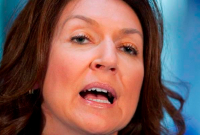Support strong Canadian climate journalism for 2025
The Liberals must be defeated in October's election in order to properly clean up Quebec politics, says a former star witness in the province's corruption inquiry.
Most of the people convicted in the high-profile cases investigated by Quebec's anti-corruption unit have pleaded guilty and served no jail time, while high-level actors at the provincial level have barely been touched, says Lino Zambito.
"If people want a glimmer of hope that a proper cleanup will be done — it starts with the Oct. 1 election," Zambito said during a recent interview. "That's the minimum. If not, we'll continue to go in circles — we'll go after small players, a few entrepreneurs, and those responsible will get away."
Zambito's comments reflect a frustration in Quebec after recent acquittals in high-profile fraud cases and an increasing recognition that economic crimes are often complicated and difficult to bring successfully to trial.
"Collusion is hard to prove," Zambito said. "The files are complex — but the quality of the evidence is not there either."
Zambito pleaded guilty in 2015 to several fraud-related charges in connection with a scheme to keep a mayor in power north of Montreal in order to win contracts for his construction company.
He flipped after getting caught, however, and became one of Quebec's best-known whistleblowers.
His 2012 testimony at the Charbonneau Commission described vast collusion and corruption schemes involving companies, politicians and organized crime around the Montreal area.
Zambito also co-operated with Quebec's anti-corruption unit until last February, when he cut ties with the squad after he found out he was on a list of people it thought might be the source of leaks to journalists.
He has denied leaking anything to the press.
"The work that we did, we shed light on the (collusion) system," Zambito said. "We exposed it, but the cleanup is far from being done. We have refused to seriously investigate the provincial political parties."
For months, Quebec media have been reporting on turmoil within the anti-corruption unit, which is known by its French acronym, UPAC. Reports suggest the unit has a difficult work environment with low morale.
A report in Le Journal de Montreal earlier this month alleged UPAC officers are openly complaining that prosecutors are delaying the arrests of Liberal party-connected fundraisers accused of fraud. The prosecutors' office has denied the reports.
Moreover, documents leaked to the press revealed UPAC has for years been investigating former Liberal premier Jean Charest and party treasurer Marc Bibeau on illegal electoral financing suspicions.
No arrests have been made in either investigation.
Created in 2011 to tackle the incessant allegations of fraud in the province, the anti-corruption unit can boast of successes.
Between 2001 and the end of 2017, the unit says it arrested and charged 331 people and companies with crimes. Between the same time, 113 people or companies were convicted and penalties worth $3.3 million were imposed on them.
But within those figures is the reality that with the high-profile cases, most of those convicted haven't served a day in jail.
Of the eight people arrested for fraud in 2011 in the community of Boisbriand, for example, six were convicted — including Zambito — and only two of them served jail time. Zambito served his sentence in the community.
Out of 16 people arrested in 2012 for fraud-related crimes in Mascouche, north of Montreal, four were convicted and two served jail time. The town's mayor, accused of running a kickback scheme with construction companies, died before he went to trial.
In Laval, ex-mayor Gilles Vaillancourt was sentenced to roughly six years in jail in another massive kickback operation — and he received day parole after being incarcerated for less than one year. Most of those convicted in the case did not serve jail time.
In May, a judge acquitted former high-ranking Montreal councillor Frank Zampino and construction entrepreneur Paolo Catania in a fraud case that grabbed big headlines when the two were originally arrested.
Quebec court Judge Yvan Poulin wrote the Crown's case was circumstantial and its logic was at times speculative or a matter of conjecture.
Municipal actors have so far been the focus of UPAC's investigations.
One of the only provincial players arrested by the unit was the former Quebec deputy premier Nathalie Normandeau. The ex-Liberal is facing fraud and breach of trust charges and is awaiting trial.
Zambito says the head of UPAC, Robert Lafreniere, needs to go.
"I'm not sure in a private company or a serious organization, when the results aren't there, they keep the same people in power," he said. "We make changes so the organization does its work correctly."
A spokesperson for UPAC said "the results of UPAC's work aren't limited to criminal convictions. For example, we have a team that works with (the Revenue Department), which helps to get civil convictions against people and companies."
Jean Pascal Boucher, the spokesman for Quebec's prosecutors, said it could be misleading to evaluate the work of police and Crown attorneys simply by the sum of the penalties imposed on people who plead or who are found guilty.
Often, people convicted of fraud and other related charges don't have criminal records, which factors into their sentencing, he explained.
"Courts have recognized that a suspended sentence is also a penalty that deprives people of their liberty," he said via email.
Zambito said he thinks fraud-related crimes should receive stiffer sentences.
"Take my example," he said. "I pleaded guilty and even if my sentence was served in the community, I received one of the harsher sentences compared with entrepreneurs in other cases who didn't collaborate — we have a problem.
"I think sentences (for economic crimes) should be a lot more severe."




Comments
Just like in British Columbia, I see. The Liberals had to vanish to help put an end to corruption. Christy Clark somehow managed to make Saskatchewan's Grant Devine look good! Maybe the Quebec Liberals did the same, but then again I am not familiar with Francophone politics.